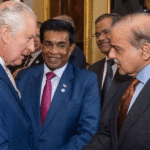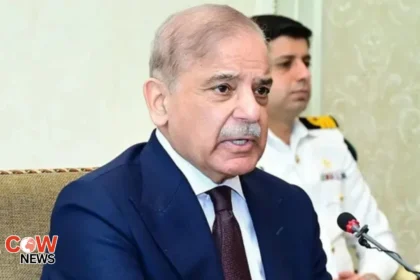Introduction
In a striking revelation, the Federal Investigation Agency (FIA) of Pakistan has apprehended one of its own officials, Aneeq, along with his father, for their alleged roles in the illegal issuance of blue passports to Afghan citizens between 2020 and 2022. This case not only raises serious questions about the integrity of the FIA but also underscores significant national security implications and the potential ramifications for Pakistan’s diplomatic relations. As the investigation unfolds, it is essential to examine the context, implications, and broader consequences of this scandal.
The Significance of Blue Passports
What Are Blue Passports?
In Pakistan, blue passports are diplomatic travel documents reserved for individuals holding specific governmental or diplomatic positions. These passports grant special privileges, including ease of travel and certain protections in foreign countries. The misuse or illegal issuance of such passports can lead to severe breaches of national and international law, jeopardizing security and diplomatic protocols.
The Value of Diplomatic Passports
Diplomatic passports are not merely travel documents; they represent the authority and integrity of a nation. They facilitate smoother passage across borders for diplomats and government officials, enabling them to perform their duties effectively. Thus, the unauthorized issuance of blue passports undermines this system and can lead to significant diplomatic repercussions.
Background of the Case
Initial Discoveries
The scandal began to surface when Turkish authorities intercepted Afghan nationals attempting to use fraudulent passports, raising alarms regarding the authenticity of the documents they possessed. This led to a collaborative investigation between Turkish and Pakistani officials, revealing a network of corruption within the FIA that extended into passport issuance.
The FIA’s Response
As the investigation progressed, the FIA began to uncover a complex scheme that involved not only Aneeq but also several other individuals connected to the passport office. The agency took significant steps to address the issue, emphasizing the need for accountability and transparency in government operations.
Arrests and Charges
The initial arrests included four suspects from the passport office, who were implicated in issuing fraudulent passports to Afghan citizens. This groundwork paved the way for Aneeq’s arrest. The FIA has categorized the case as terrorism, underscoring the severity of the charges against those involved and highlighting the risks posed by such illegal activities.
The Arrest of Aneeq
Details of the Arrest
Aneeq’s arrest marked a pivotal moment in the investigation. Allegations against him include not only the illegal issuance of diplomatic passports but also providing sensitive information to accomplices involved in the fraud. These actions have led the FIA to assert that Aneeq’s misconduct significantly endangered national security.
Legal Framework
The FIA has registered a case of terrorism against Aneeq, reflecting the serious nature of his alleged offenses. Under Pakistani law, the unauthorized issuance of passports, particularly diplomatic ones, can have severe legal consequences, including lengthy prison sentences and hefty fines. The categorization of the case as terrorism further emphasizes the potential threats associated with such actions.
Implications for National Security
National Security Concerns
The illegal issuance of blue passports raises several national security concerns. Firstly, it creates a risk of allowing individuals with potentially harmful intentions to travel under diplomatic immunity. This breach could facilitate criminal activities, including terrorism, human trafficking, and illegal immigration, thereby compromising the safety of both Pakistani citizens and international partners.
Strain on Diplomatic Relations
The misuse of blue passports has broader implications for Pakistan’s diplomatic relations. Countries like Turkey, which rely on the integrity of travel documents, may view this scandal as a breach of trust. Such incidents can lead to increased scrutiny of Pakistani nationals abroad and complicate diplomatic negotiations, potentially straining relationships that have been carefully built over years.
The Investigation’s Scope
Broader Network
The FIA’s investigation into the issuance of blue passports has unveiled a larger network of corruption and misconduct. Investigators are now focusing on identifying other officials within the FIA and related agencies who may have participated in or facilitated these illegal activities. The goal is to dismantle the entire network that allowed such breaches to occur.
Continuous Investigations
The FIA has committed to conducting thorough investigations to uncover all layers of corruption involved. This ongoing scrutiny is essential not only for bringing the perpetrators to justice but also for restoring public trust in government institutions.
Community and Public Response
Public Outrage
The revelation of this scandal has sparked outrage among the public and media. Citizens expect accountability and transparency from government agencies, and this incident has raised concerns about the integrity of the FIA as a key institution responsible for maintaining law and order.
Calls for Reforms
In light of the scandal, there have been increasing calls for reforms within the FIA and other governmental agencies. Advocates argue that stricter oversight and more rigorous ethical standards are necessary to prevent such incidents from occurring in the future. This includes calls for better training for officials and the implementation of robust checks and balances.
Impact on Public Trust
The scandal has the potential to erode public trust in governmental institutions. Citizens who rely on these agencies for security and legal protections may begin to question their efficacy and commitment to upholding the law. Restoring this trust will require significant efforts from the FIA and related agencies.
The Cultural Context of Corruption
Corruption in Pakistan
Corruption is a persistent challenge in Pakistan, affecting various sectors and institutions. The illegal issuance of passports is just one manifestation of a broader issue that undermines the rule of law and democratic governance. Addressing corruption requires a comprehensive approach that includes legal reforms, public accountability, and cultural changes.
Importance of Accountability
Ensuring accountability is crucial for combating corruption. This includes holding individuals responsible for their actions, as well as implementing systemic changes to prevent future misconduct. Strengthening institutions and promoting a culture of transparency can help restore faith in the government.
Future Directions
Strengthening Regulations
In the aftermath of this scandal, it is imperative for the FIA and other governmental bodies to strengthen regulations regarding passport issuance. This includes developing clearer guidelines, enhancing training for officials, and implementing stricter penalties for those who violate the law.
Building International Partnerships
Collaborating with international partners to improve the integrity of travel documents is essential. By fostering relationships with other countries and sharing best practices, Pakistan can enhance its ability to combat passport fraud and other related issues.
Enhancing Oversight Mechanisms
Establishing robust oversight mechanisms within the FIA can help prevent corruption from taking root. This includes regular audits, transparency in operations, and creating channels for whistleblowing, allowing officials and citizens to report unethical behavior without fear of retribution.
Conclusion
The arrest of Aneeq and the ongoing investigation into the illegal issuance of blue passports underscore a significant breach of trust within the FIA and raise critical concerns about national security and diplomatic integrity. As the investigation progresses, it will be crucial for Pakistan to address the systemic issues that allowed such corruption to flourish.
Restoring public trust in governmental institutions requires commitment and accountability. By addressing the root causes of corruption and fostering a culture of integrity, Pakistan can move forward and strengthen its national security and diplomatic relations. The implications of this scandal will resonate beyond the individuals involved, highlighting the need for systemic change in how governmental agencies operate and maintain their credibility on the international stage.
#FIA #Aneeq #BluePassports #NationalSecurity #Pakistan #Corruption #DiplomaticRelations #Terrorism #Investigation #Integrity #PassportFraud #Accountability







